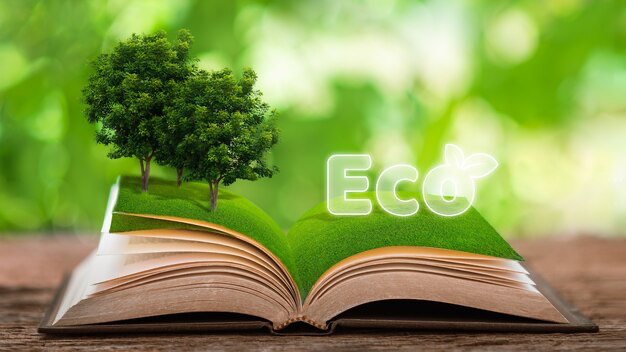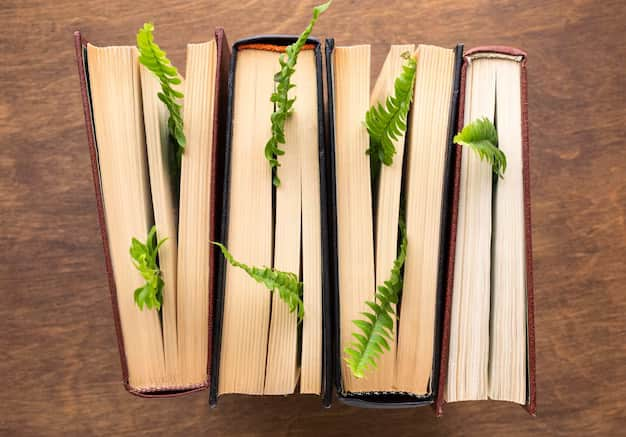We’ve delved deep to uncover the most acclaimed ecology books that consistently make their way to the top of multiple “Best of Ecology” reading lists. These top 10 books are ranked based on their frequency on these lists – a testament to their profound impact and rich, insightful content.
From exploring the interplay of organisms with their environment to unraveling the mysteries of natural ecosystems, these books provide a comprehensive understanding of our planet’s heartbeat. They are an ideal pick for budding ecologists, seasoned environmentalists, or anyone with a love for nature and a thirst for knowledge.
Top 10 Best Ecology Books
10.) ‘Climate Chronicles: A Tale of Man, Nature, and Changing Climate’ by Elizabeth Kolbert
This transformative piece by Elizabeth Kolbert is a must-read. Originally based on an award-winning series in The New Yorker, this book has been further enriched with extensive research, turning it into an essential primer on the most formidable challenge of our times: climate change.
Emerging from the lists of:
- Mother Nature Network;
- Goodreads.
9.) ‘Serenity: Thoreau’s Walden Experience’ by Henry David Thoreau
In the mid-19th century, Thoreau chose a life of solitude in a cabin beside the tranquil waters of Walden Pond. His intention: to commune with nature and detach from the whirl of social life. He meticulously documented his experiences over two years, culminating this masterpiece that sings praises of the beauty in simplicity and self-reliance.
Noted in the lists of:
- Goodreads;
- Mother Nature Network.
8.) ‘Ecological Principia: Unifying Ecology Theory’ by Mark Vellend
Unveiling a unique perspective, ‘Ecological Principia’ is a deliberate attempt to amalgamate the various theories, models, and concepts prevalent in community ecology. Vellend employs a comparative study with evolutionary biology, adopting its systematic framework of population genetics theory to structure his discourse on community ecology.
Identified on the lists of:
- Bioteaching;
- Dynamic Ecology.
7.) Delving into Extinction: A Bitter History of the Future by Elizabeth Kolbert
Recognized by:
- Goodreads;
- Small Pond Science.
Kolbert dissects the heart-wrenching tale of the Sixth Extinction, portended to be the most brutal wipe-out since the asteroid obliteration that annihilated dinosaurs. The culprit, this time, is man. Heightening the narrative with immersive research, Kolbert unveils the human imprint on our planet. She sparks a contemplation on our legacy and the poignant truth of vanishing biodiversity, compelling us to introspect the essence of humanity itself.
6.) The Fall of Predators: An Ecosystem in Tumult by William Stolzenburg
Highlighted on the lists of:
- Small Pond Science;
- Goodreads.
In the intricate dance of ecology, predators are the apex dancers who keep the rhythm in check. Stolzenburg sheds light on the alarming disappearance of these charismatic species due to anthropogenic influences, and emphasizes their vital ecological roles. His words bring to life the profound implications of their absence and the ensuing ecological chaos.

5.) Nature Unfiltered: Rhythms of the Forest by David George Haskell
Featured on:
- Small Pond Science;
- Goodreads.
Haskell’s unique narrative presents a remarkable year-long vigil of a square-meter of old-growth Tennessee forest. From the smallest microorganisms to the mightiest mammals, from the earliest bloom of spring to the last leaf of autumn, Haskell paints a vivid picture of life in the forest. This book offers a stellar insight into the complexities of ecosystems that have thrived for thousands, sometimes millions, of years.
4.) Echoes of a Silent Spring by Rachel Carson
Highlighted by:
- Goodreads;
- Sustainable Fashion Forum.
Rachel Carson’s ‘Echoes of a Silent Spring’ first graced the pages of The New Yorker in the summer of 1962. A few months later, it evolved into a masterful book that spawned global discord, leading to the prohibition of DDT and catalyzing significant modifications in the regulations concerning air, land, and water. Carson’s deep-rooted apprehension for the planet’s future echoed around the globe, making her book the bedrock of the environmental movement and earning it a distinguished spot in the annals of 20th-century literature.
3.) A Year in Sand County: An Ecological Journal by Aldo Leopold
Chosen by:
- Mother Nature Network;
- Goodreads;
- Eco Lifestyle Advocate.
Aldo Leopold’s ‘A Year in Sand County: An Ecological Journal’ paints awe-inspiring canvases of the untouched American landscape – from the towering mountains to the sprawling prairies, from the arid deserts to the serenading coastlines. Leopold takes his readers on a mesmerizing journey through the seasons, exploring America’s invaluable natural assets. He intricately sketches the intricate interplay of biotic communities, elucidates the detrimental effects of human interference, and courageously advocates for the preservation of our beloved planet.
2.) The Anatomy of Nature: Dissecting Ecology by Robert L. Smith, Thomas M. Smith, Graham C. Hickman, Susan M. Hickman
Listed by:
- IASZoology;
- Learn 4 Good;
- Wiki.ezvid.
In its ninth edition, ‘The Anatomy of Nature: Dissecting Ecology’ continues to serve as a guiding light in understanding the intricate mechanisms of ecology. The book encapsulates the relevance of ecological knowledge to our everyday lives while focusing on the human imprint on various ecosystems. The authors employ a delicate balance between theory and empirical evidence, helping the readers to understand, apply, and develop remarkable quantitative and analytical skills. The book presents a vivid study of the subject enriched by high-definition illustrations, graphs, and tables, and peppered with the latest research findings.
1.) The Pillars of Ecology: Core Concepts and Evolutionary Principles by Eugene Odum, Gary W. Barrett
Recognized by:
- IASZoology;
- Learn 4 Good;
- Wiki.ezvid.
‘The Pillars of Ecology: Core Concepts and Evolutionary Principles’ is not just a book—it’s a legacy. Its author, the late Eugene Odum, was a key figure in establishing the systems approach to ecology, thereby defining how we perceive ecosystems today. This fifth edition, co-authored by Odum’s disciple Gary Barrett, marries the original holistic view with an evolutionary perspective. Along with traditional topics, the authors introduce fresh chapters on landscape, regional and global ecology, expanding the horizons of the ecological panorama. As a medley of inspiration and wisdom, the book also features a final chapter offering a comprehensive guide to statistical analysis for ecology students.
Oliver Sacks
Renowned neurologist and writer, Oliver Sacks, has made significant contributions to the fields of medicine and literature, often delving into the fascinating intersection of neuroscience and human experience. While he may not be primarily known as an ecologist, some of his works provide profound insights into the human connection with the natural world.
Combining the themes of ecology and the human experience, Sacks’ works serve as a bridge between the worlds of science and nature, offering readers a deeper understanding of the connections that bind us to the world around us.
Conclusion
Casting a spotlight from the tenth to the first book, our list transports you through the mesmerizing world of ecology. Each title, each chapter, and each author connect you to the world around us, helping us understand our place within nature’s grand design. Every book promises to deepen your ecological literacy, sharpen your analytical skills, and ignite your passion for the natural world. As you embark on this enlightening journey through the captivating realm of ecology, let these titles be your trusty guides.



